The Challenge
An estimated eight out of ten rural women in India depend on agriculture for their livelihoods. Land is a key resource for farmers, and thus women’s ability to access and use land is a major factor in their agricultural productivity and ability to earn an income. Despite making up nearly half of India’s agriculture labor force, women own less than two percent of farmland. In fact, less than ten percent of privately-held land nationwide is held by women.
In the state of West Bengal, land ownership is concentrated in the hands of men. Legal restrictions prohibit the joint titling of land, where both spouses are listed as landowners, except for government land grants. This means most land is registered solely to men as the customary “head of household.” Women face steep barriers in accessing farmland, particularly women from Scheduled Tribes and Castes with lower social status and those from religious minorities. Farmers usually cultivate crops on small plots under a variety of land tenure arrangements. De facto owners cultivate land that they are eligible to inherit, but land is often still registered in the name of a father or grandfather. Other farmers operate as informal tenants who cultivate under verbal agreements with landowners. Land leasing is legally restricted, though in reality the practice is widespread. Landowners are often wary of leasing land to women, as farming is seen as a male occupation, limiting women’s ability to access land for independent farming.
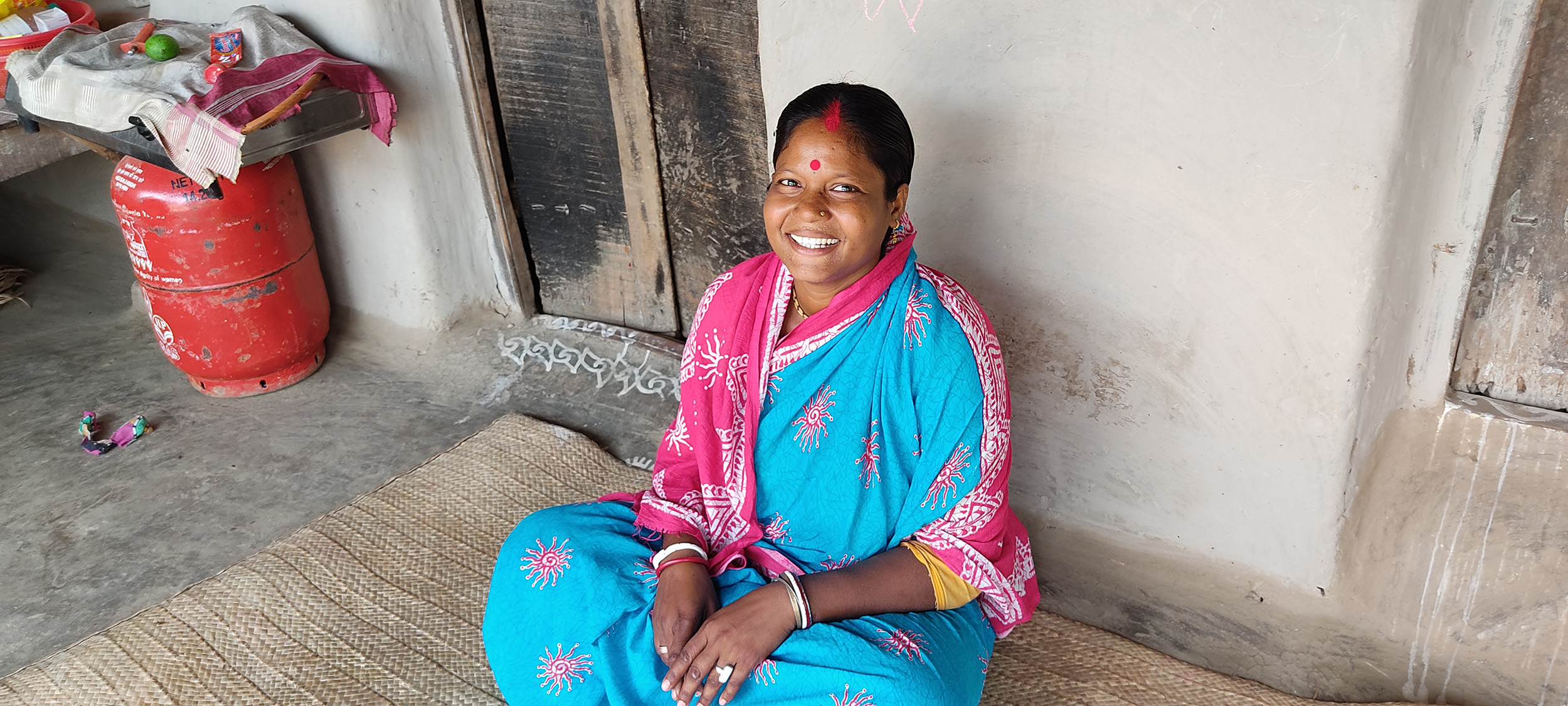
Chaina Chowdhury (pictured) is 26 years old and has never owned land. She belongs to a caste with few privileges and lives with her husband in a small village in West Bengal. Like millions of men and women across the state, she leases land and pays the lease with part of the crops she grows, including potatoes and rice. Photo credit: ILRG.
Restrictive gender norms act as a major barrier to greater land tenure security for women. Often, both men and women do not view women as farmers; women are viewed more as helpers in their husband’s farming enterprise. This limits women’s ability to make decisions about the plots they farm. Traditionally, men have control over household resources, including land. Men in households, communities, and in the supply chain more broadly are skeptical of women’s added value to farming, and agricultural training is rarely offered or made available to women. Time poverty and mobility constraints also prevent women from attending training or participating in other economic income-generating opportunities, since they hold a disproportionate share of unpaid caring and household responsibilities.
Despite these constraints, women comprise a significant portion of the agricultural labor force in West Bengal’s potato value chain, and play critical roles in preparing fields, cutting seeds, and harvesting crops. But this work often remains undervalued or unrecognized, leaving women largely invisible in agricultural policies and programming.
The Innovation
In 2017, a partnership between USAID and PepsiCo evolved from a shared vision to promote gender equality and women’s empowerment through increased access to land and extension services in PepsiCo’s potato value chain in West Bengal. Understanding the challenges that women potato farmers face, the partnership is improving women’s integration into PepsiCo’s supply chains, while helping communities shift harmful gender norms and supporting innovative ways for women to access land. At the same time, the partnership is providing PepsiCo staff with the information and skills they need to address gender equality issues and incorporate women’s economic empowerment throughout their work. This approach supports 40 PepsiCo staff in West Bengal with training in gender equality and women’s roles in agriculture. Training and support on topics like mitigating the risk of gender-based violence helps PepsiCo staff address women’s empowerment issues within their supply chains and their own workplace.
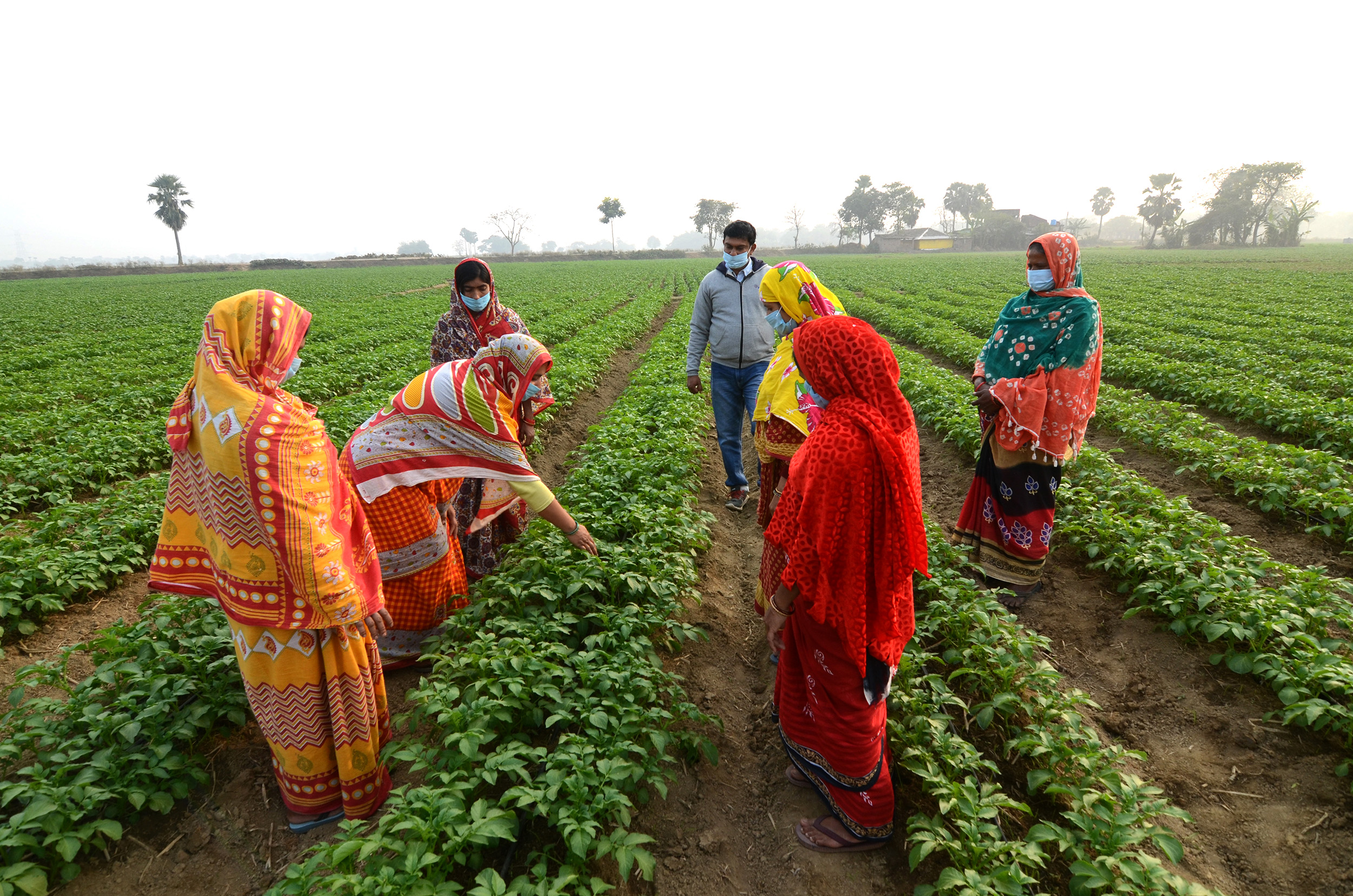
A women’s land leasing group supported by the USAID-PepsiCo partnership inspect the fields in the first women-led PepsiCo potato demonstration farm in West Bengal. Photo credit: Subarna Maitra/ILRG.
Primary approaches to secure women’s land rights and promote empowerment include:
- Supporting women’s access to land by helping women establish land leasing groups to collectively lease and farm together, allowing women to enter the potato supply chain as independent producers.
- Training over 1,000 female farmers in potato agronomy and sustainable farming practices while increasing women’s access to key productive inputs such as seeds, land and training to improve productivity.
- Employing and training 21 women as community and field agronomists, which not only helps USAID and PepsiCo reach and support women farmers, but it demonstrates to the communities that women can be valuable sources of agricultural knowledge.
- Supporting women-led demonstration farms, which agronomists use to promote the adoption of sustainable farming practices and technologies. This showcases women as lead farmers and increases community acknowledgement of women’s roles in agriculture.
- Promoting household and community dialogues and action to shift harmful gender norms that limit women’s participation in agricultural livelihoods. This increases women’s decision-making power over land use and farming, improves distribution of household work, increases men’s acceptance of women’s economic empowerment, and reduces acceptance of gender-based violence.
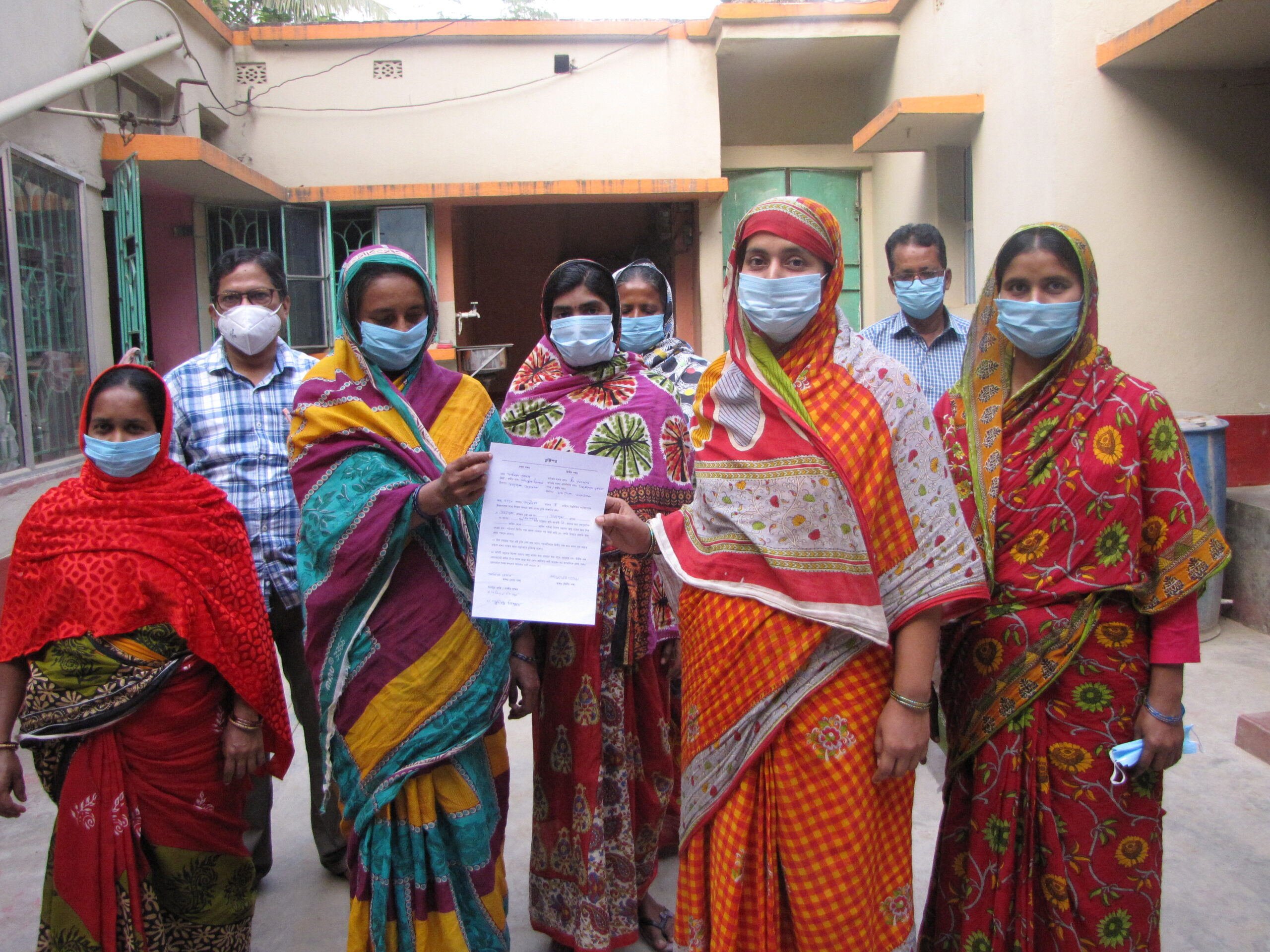
A women’s land leasing group supported by the USAID-PepsiCo partnership in West Bengal displays their land lease, recognizing their informal agreement to lease land from a local landlord. Many of these groups are composed of women from vulnerable groups, including Scheduled Castes and Tribes. Photo credit: Landesa.
The partnership is making the business case for women’s economic empowerment by demonstrating that by enhancing access to land and other productive resources and recognizing women’s roles as farmers, global supply chains become more productive, creating new revenue streams for rural families and companies. This initiative in West Bengal will inform a larger USAID-PepsiCo Global Development Alliance, with the potential to scale women’s empowerment to other PepsiCo markets.
“Women are an integral part of the agricultural supply chain, but they don’t receive the access to finance, to information, to land, to technical assistance that male farmers often receive. By making sure that the women in our supply chains are able to access those resources and benefit from the incredible support that we provide our farming communities, we can ensure that the productivity of all of our farms can increase.”
Margaret Henry, PepsiCo’s Director of Sustainable Agriculture
In this short video, farmer Mafija Begum and PepsiCo India Agro Director Pratap Bose talk about how empowering women potato farmers increases their income and decision-making power, as well as PepsiCo’s productivity.
The Champions
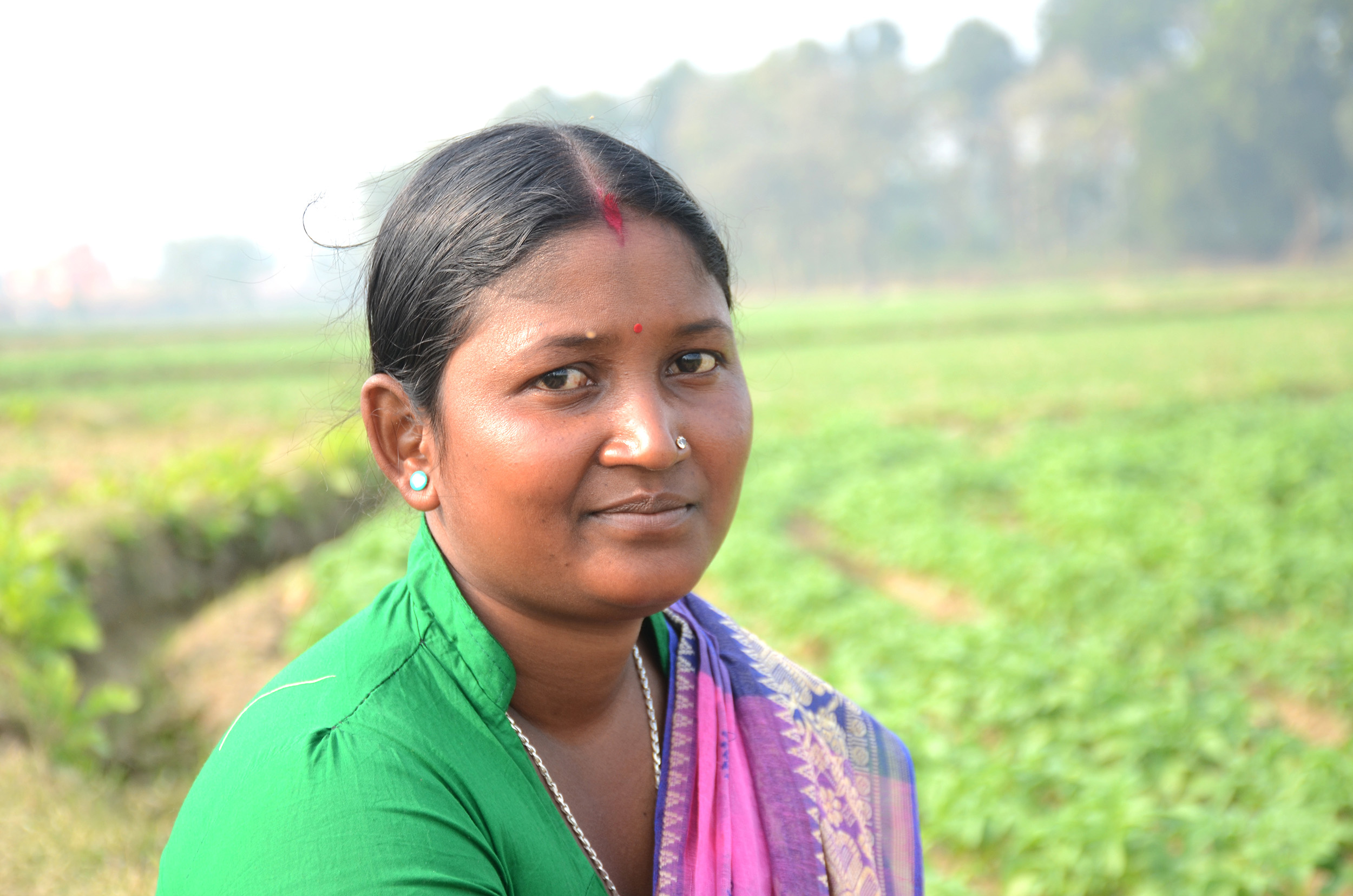
Arati Besra. Photo credit: Subarna Maitra/ILRG.
“I have been able to prove that I can do this. Initially, my husband doubted my ability to perform. It took almost two months for him to acknowledge my efforts. Now I have acceptance and respect from other women and male farmers too. I am learning many new things and I am trying to apply those lessons at a personal level and also reach out to other women like me.”
Arati Besra, Community Agronomist,
Dhuluk, West Bengal
Arati Besra is a member of a Scheduled Tribe, a group of Indigenous Peoples that are among the most disadvantaged socio-economic populations in India. With her leadership, the self-help group of 12 women from Scheduled Tribes she founded in 2005 joined the PepsiCo potato supply chain as a land leasing group for the 2020-2021 season. Arati oversees their record-keeping and is the primary spokesperson for the group in outward-facing negotiations. She also serves as a community agronomist under the USAID-PepsiCo partnership, providing support and advice to 40 PepsiCo farmers in her village. Arati is excited about her future as a farmer, and with the additional income from her new role as a community agronomist, she plans to support her daughters to finish their education and delay marriage.
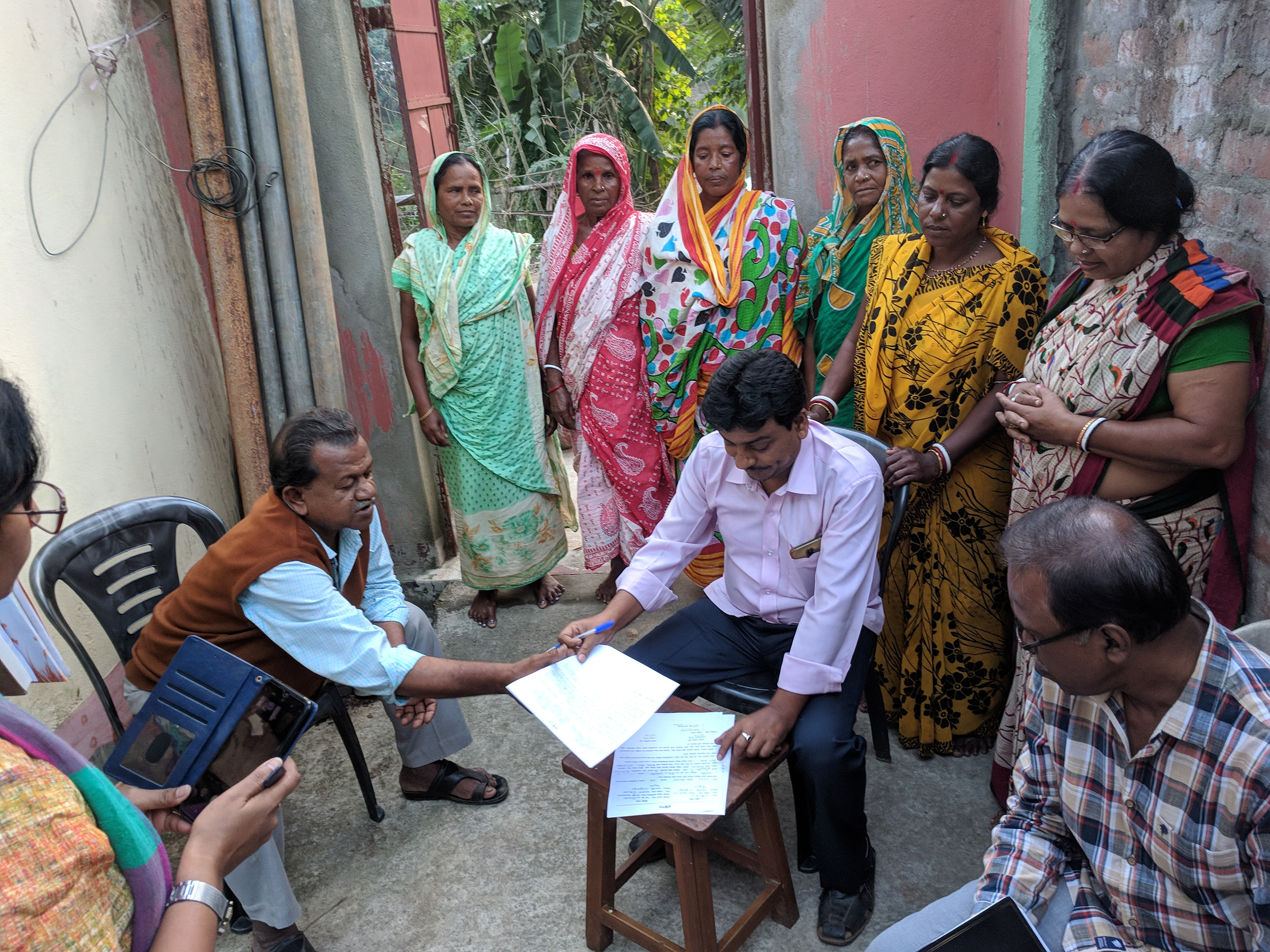
Shyamal Pal helps a women’s land leasing group sign a lease with a local landlord. Photo credit: ILRG.
“I sincerely believe that women can do everything required for successful farming. With support from PepsiCo, the women’s group leased one acre of land to plant potatoes and overcame adverse weather to emerge successful with a financial return. This ‘never seen earlier’ phenomenon drew the attention of the entire village community here and had a demonstrative effect on other women’s groups.”
Shyamal Pal,
PepsiCo aggregator in West Bengal
Shyamal Pal is an aggregator who organizes farmers to produce PepsiCo potatoes. Despite local customs that disregard the role of women farmers, Shyamal is a long-time supporter of women’s empowerment and strives to work with women farmers, including supporting one of the women’s land leasing groups under the USAID-PepsiCo partnership. Shyamal’s leadership is leading other aggregators to start working with women farmers.
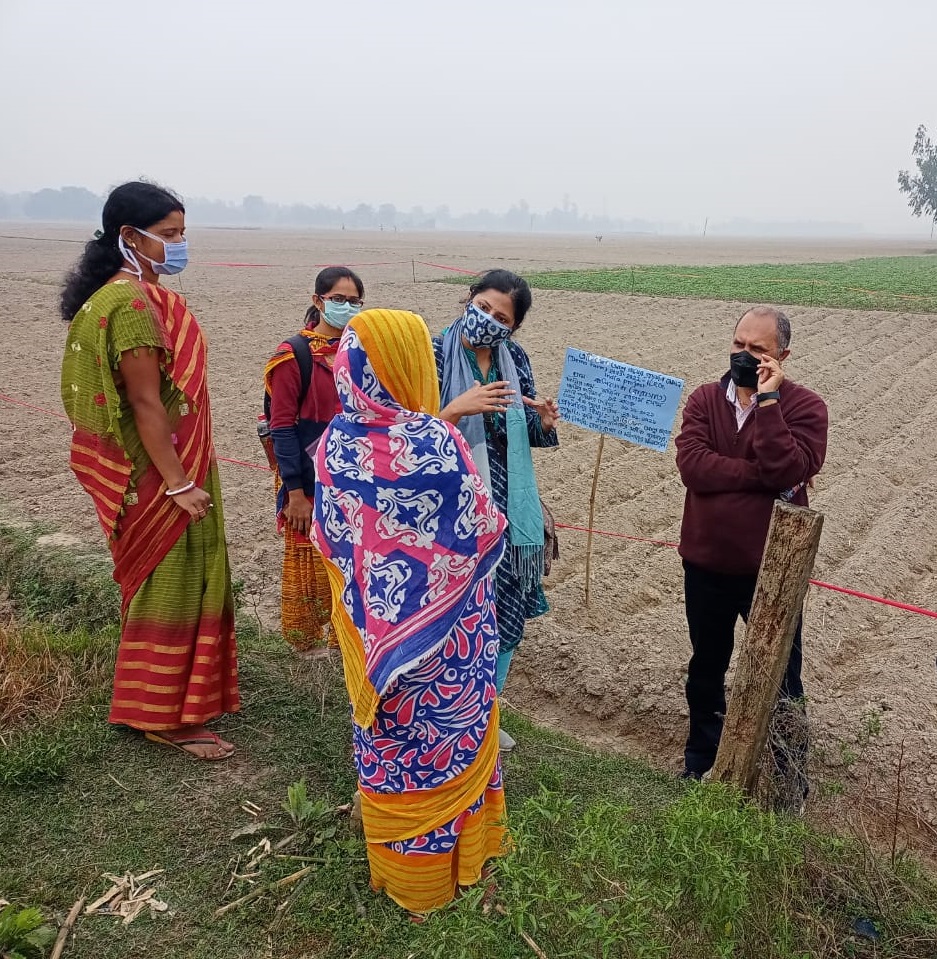
Dr. Susheel Sankhyan interacting with farmers. Photo credit: ILRG
“At PepsiCo, we have adopted a ‘we together’ approach in order to bring change and create impacts in gender equality in West Bengal’s potato supply chain. On this journey of transformation over the last two and a half years, we have seen an increase in the acceptance of women as partners and contributors to the supply chain. The best way to do this is by showcasing the value added by women farmers on demonstration farms, so people can see their skills in agronomy, decision-making, and finally, net production.”
Dr. Susheel Sankhyan,
Manager of Sustainable Agriculture, PepsiCo India
As the manager of sustainable agriculture, Dr. Susheel Sankhyan leads the implementation of innovative solutions to overcome challenges that can affect PepsiCo India’s supply chain, such as drip irrigation, improved nutrition, and sustainable farming practices. Under the USAID partnership, Dr. Sankhyan supports the West Bengal PepsiCo team to ensure that the company obtains high quality potatoes while supporting farmers’ livelihoods and the adoption of sustainable farming practices, in pursuit of PepsiCo’s larger climate goals. Though initially skeptical of whether women’s engagement will increase productivity and quality of potato harvest, he now sees women’s participation as a way for PepsiCo to proactively expand their supply base in ways that benefit both farmers and the environment. Dr. Sankhyan sees women’s economic empowerment as an important legacy from his career at PepsiCo.

“PepsiCo is committed to sustainable agriculture all around the world. We are working with farmers in 60 different countries that we source from to improve farming livelihoods, promote women’s empowerment, work on regenerative agriculture farming practices, reduce their vulnerability to climate change, reduce the emissions, and improve the watershed health on those farms.”
Margaret Henry,
PepsiCo’s Director of Sustainable Agriculture
Margaret Henry serves as PepsiCo’s global Director of Sustainable Agriculture. In this role, Margaret meets with farmers and suppliers around the world to assess the environmental footprint of the crops that eventually go into PepsiCo products. She evaluates the impact agricultural practices can have on human rights and environmental sustainability, and collaborates with organizations like USAID to improve PepsiCo’s sustainability agenda. As climate change has a disproportionate impact on farmers, Margaret is instrumental in developing programs that increase the reach of regenerative agriculture, a set of practices that improve and restore ecosystems while building resilience for PepsiCo, the environment, and farming communities.
The Impact
Since 2019, USAID and PepsiCo have increased women’s participation across West Bengal’s potato supply chain.
From PepsiCo’s perspective, the partnership has helped the company expand its supply base in the region, and is providing a replicable model for West Bengal. The principles that are being applied can be further integrated into the PepsiCo supply chain in other areas of the world where they source from smallholder farmers through an aggregation model. Indicators of improved business performance have been observed, including above-average productivity by women’s land leasing groups, increased brand loyalty, and potential expansion of the farming supply base for PepsiCo. Gender training for PepsiCo staff and aggregators has improved the way they train and work with women farmers.
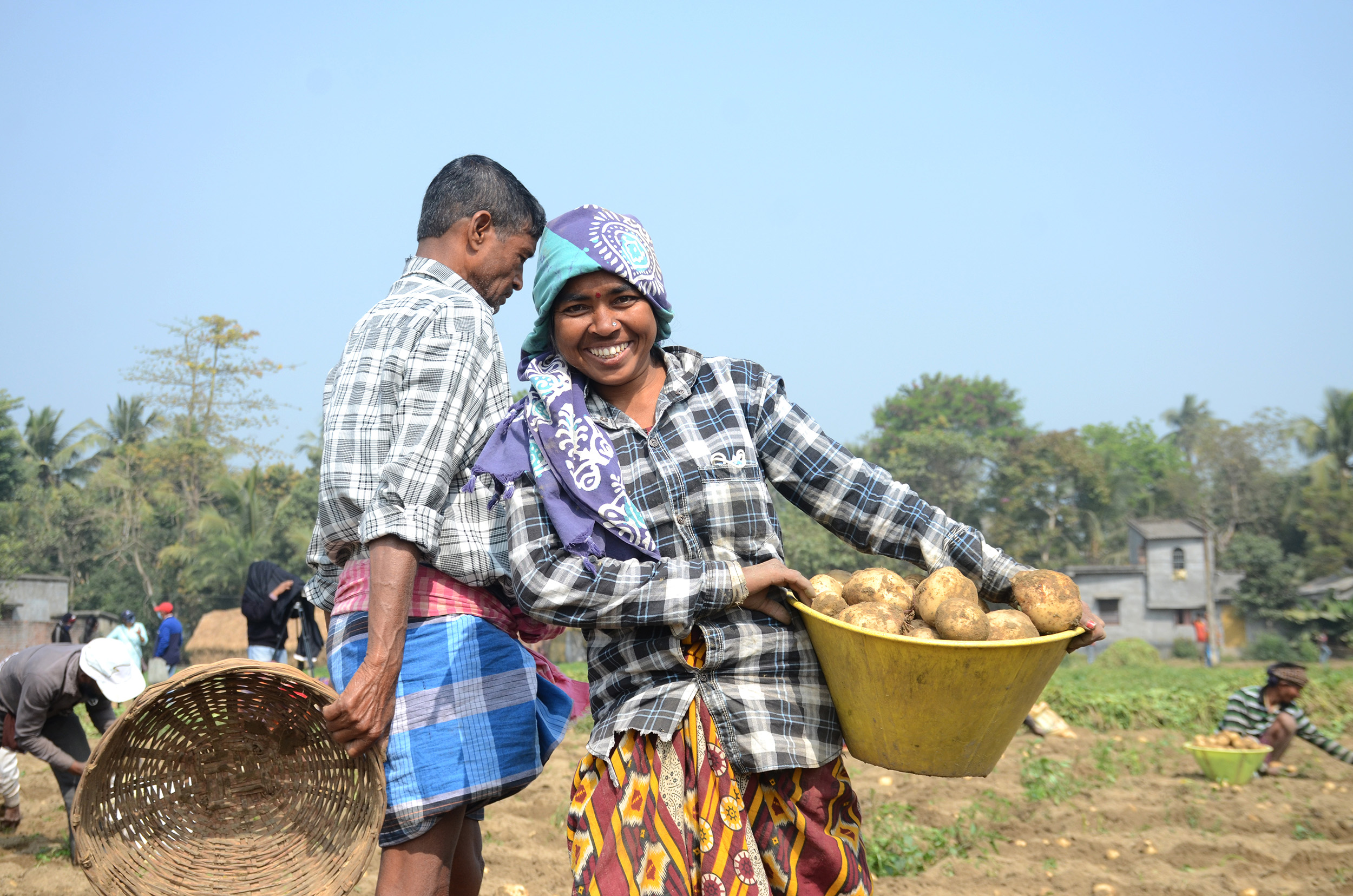
Potato harvest in Moloypur, Hooghly. Photo credit: Subarna Maitra/ILRG.
The partnership is also leading to broader institutional changes within PepsiCo India. The company is now including both men and women as lead farmers in its official lists of suppliers and using promotion of women’s empowerment as a metric to recognize aggregators’ efforts every season. A growing number of PepsiCo staff and aggregators are taking their own initiative to reach out to and train women across West Bengal, beyond the partnership’s initial 12 target communities.
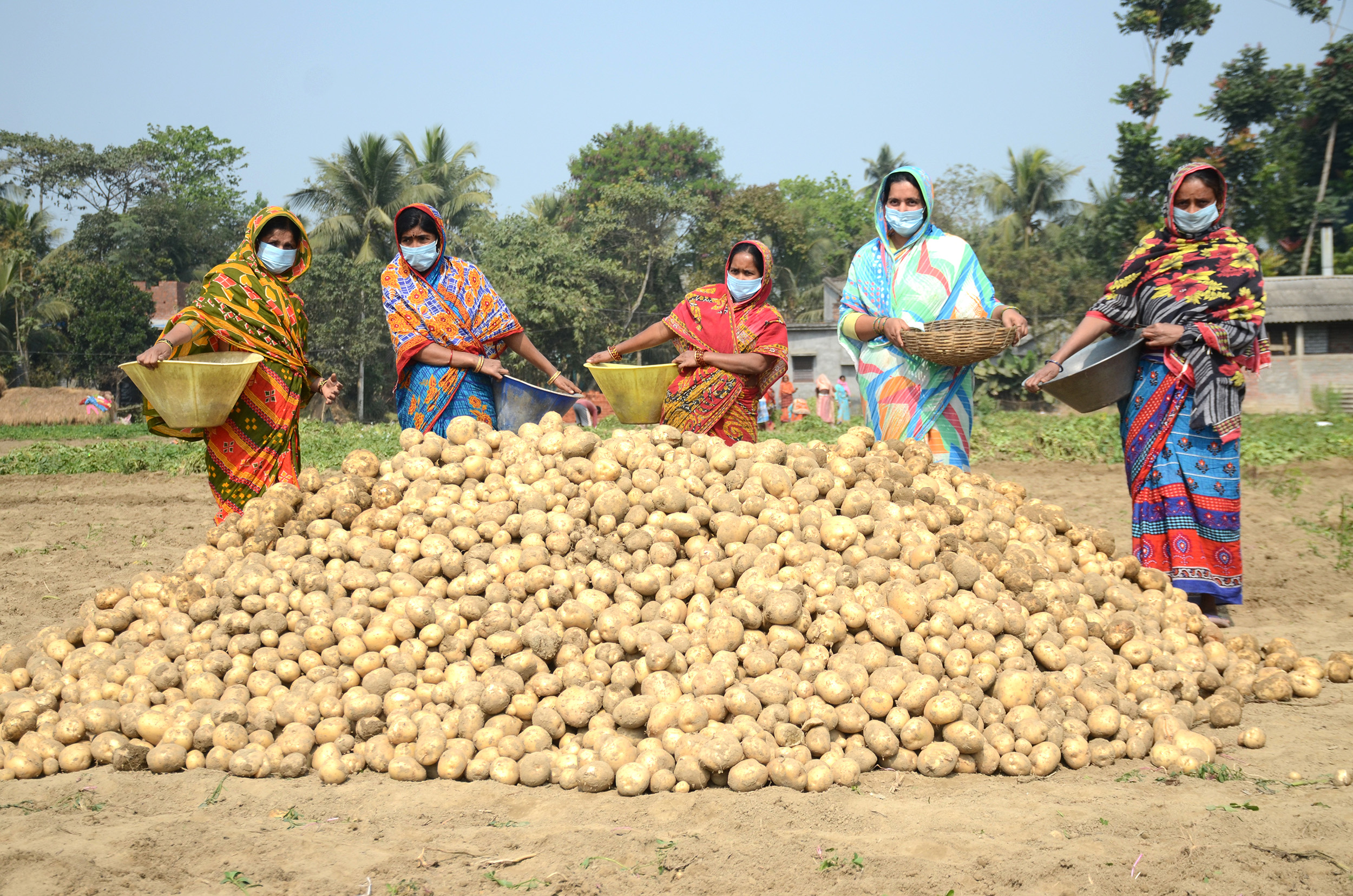
Members of the Eid Mubarak women’s land leasing group during potato harvest in Moloypur, Hooghly. Photo credit: Subarna Maitra/ILRG.
“Women’s empowerment is having a huge impact on our supply chain. By training the women on the technical parts of farming and on the social part, we automatically impact the quality of the product.”
Pratap Bose, Agro Director, PepsiCo India
For local communities, the partnership has helped women enter the PepsiCo supply chain and earn additional income for their families. PepsiCo provides a guaranteed price at the beginning of each growing season, allowing families to have a more predictable income stream. Women’s land leasing groups have expanded land access so they can successfully enter the PepsiCo supply chain and adopt sustainable farming techniques. The initiative is also increasing women’s economic empowerment. Women farmers report that they are more confident, have a stronger sense of self-worth, greater mobility, and decision making power since participating in the different activities. Many say they have seen greater support and increased acceptance from family and community members, who acknowledge their role as farmers and income earners for the family.
“We knew almost nothing except cutting seeds. Now we have learned everything about farming. Additionally, we have learned about dealing with people like tractor operators, landowners, and how to do accounting.”
Anwara Begum, woman potato farmer
The partnership is expanding economic opportunities for participating women and their families, and is influencing PepsiCo’s policies and practices to promote women’s economic empowerment globally. Building upon this initial success and drawing from lessons learned in West Bengal, USAID and PepsiCo have launched a five-year, $20 million Global Development Alliance to empower women in four countries, running from 2020-2025. This partnership will support PepsiCo’s commitment to expand regenerative farming practices across 7 million acres of farmland by 2030, improving the livelihoods of more than 250,000 people in its agricultural supply chain.
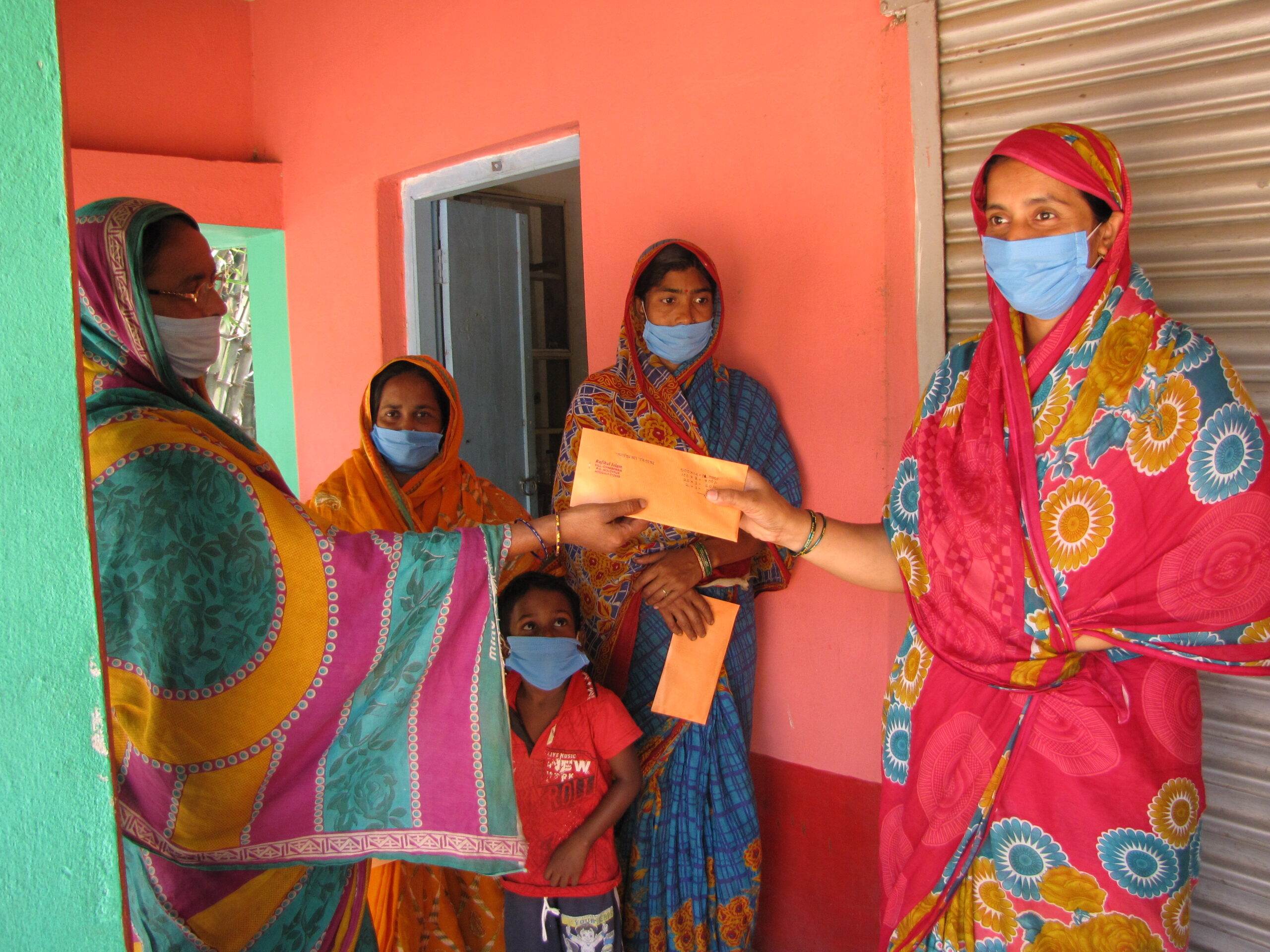
Anwara Begum (left) receiving her share of profits from the potato season from other members of the Eid Mubarak Land Leasing Group. Photo credit: Landesa.
In 2019, when Azijul Rahaman first heard his wife, Anwara Begum, and her women’s group, Eid Mubarak, were going to join PepsiCo’s supply chain as potato farmers, he was extremely skeptical. In West Bengal, gender norms limit Muslim women’s mobility, such as walking to and from agricultural fields, and their interaction with men outside of their families.
“How is it possible that women can independently farm?” Azijul asked rhetorically.
He tried to dissuade Anwara from joining the initiative, but also recognized that her previous participation in the women’s group had brought benefits to the family, giving them access to the group’s savings and loans activities.
“My husband was perturbed by remarks made by family members, who insisted that women from the Muslim community never go to agricultural fields, but I kept on raising the issue during in-house discussions and helped him understand that the other women were joining, and I could earn some additional money to support our family needs,” Anwara explains.
With the support from local male champions in the supply chain like land lessors, aggregators, and PepsiCo staff, Azijul became supportive of his wife’s endeavors. Since then, Anwara and her group have already made two good potato harvests and have embraced their role as formal suppliers in PepsiCo’s potato value chain.
The Implications
For USAID
This project demonstrates USAID’s commitment to promote secure tenure and women’s economic empowerment through private sector engagement as a pathway to achieve shared goals of economic growth, sustainable rural livelihoods, and climate change mitigation, adaptation, and resilience. This work also contributes to USAIDs broad learning goals on how to enhance program scale through private sector engagement on supply chain inclusion and sustainability.
For Private Sector Partners
Private sector partners like PepsiCo recognize that empowering women in their supply chains is not only good for gender equality and social inclusion, but good for their business. By directly engaging women in their supply chains and assisting them with access to land and technical training, companies can increase productivity, quality, profitability, brand loyalty, and sustainability. By investing in and training farmers in sustainable farming practices, companies also mitigate climate change risks and impacts. This partnership also highlights the importance of land tenure for agricultural productivity, and demonstrates innovative ways for private sector partners to tackle these issues outside of larger government policy solutions.
For Local Communities
For local communities, partnerships like this help expand women’s economic empowerment and access to livelihood opportunities in rural areas. Women farmers are given the skills they need to enter into private sector supply chains, expanding their income earning potential. This, coupled with facilitated discussions between women and their husbands about gender equality and women’s roles in agriculture, has the potential to start to shift harmful gender norms at the household level. Women’s ability to earn additional income has positive effects on household consumption, food security, health, and education outcomes. The set prices guaranteed by PepsiCo at the beginning of the season can allow for more accurate household planning to withstand adverse and unexpected environmental and health crises that can affect their production in any given year.

